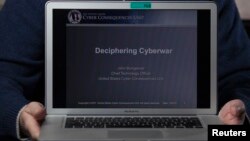Cyber espionage charges by the U.S. against five Chinese military officers will complicate Washington's relationship with Beijing, but analysts do not expect it to result in a trade war or wider disruption of ties.
The U.S. on Monday accused the People's Liberation Army officers of hacking into and stealing trade secrets from the computers of several large American nuclear, metal and solar companies.
The move represents a bold change in tactic by the Obama administration, which has long complained of alleged Chinese cyber theft that is said to have cost U.S. companies billions of dollars.
China reacted quickly and furiously, denying the charges as "made up" and telling U.S. Ambassador Max Baucus on Tuesday that the case has "seriously harmed" the U.S.-China relationship.
Kerry Brown, who heads the University of Sydney's China Studies Center, told VOA the dispute over hacking has become a significant irritant to bilateral ties. But he expects the fallout to be limited.
"I think that it's going to be a contentious issue, but I don't think we're going to get an issue of having an all-out trade war or even beyond that an actual conflict over some of the other political issues they have at the moment," Brown said.
So far, the only concrete response by China has been to pull out of a regular discussion with the U.S. on cyber theft, though Beijing has hinted more moves may be coming.
A Chinese official quoted anonymously Tuesday in the state-run People's Daily threatened Beijing will "take measures to resolutely fight back" if the U.S. continues "going on its own way."
Brown, a former British diplomat, said Beijing could decide to target U.S. companies in China in response. "China will feel very contained and threatened by this and it may well up the ante by basically picking on those companies that have very big activities and very big interests in China," he said.
One possibility is that Beijing could target U.S. businessmen, much like when it charged a British executive with the London-based GlaxoSmithKline pharmaceutical giant on bribery charges last week.
But Steve Tsang, the director of the China Policy Institute at Britain's University of Nottingham, said any retaliation will take into consideration the level of inter-dependence between the world's two largest economies.
"It is the single most important relationship in the world today. It is extremely important to China, as it is to the United States," said Tsang. "Neither government would want to put that relationship at risk and I don't think we're going to see as a result of this any forthcoming trade war between the two countries or anything like that."
The U.S. has long said Chinese cyber theft has hurt American companies' competitiveness on the global market and costs American workers jobs.
But until recent months, Washington officials had been reluctant to directly accuse the Chinese military of involvement in the hacking.
In making the announcement Monday, U.S. officials said negotiations and dialogue had failed to fix the problem and that a new tactic is necessary.
Some information for this report was provided by Reuters.
The U.S. on Monday accused the People's Liberation Army officers of hacking into and stealing trade secrets from the computers of several large American nuclear, metal and solar companies.
The move represents a bold change in tactic by the Obama administration, which has long complained of alleged Chinese cyber theft that is said to have cost U.S. companies billions of dollars.
China reacted quickly and furiously, denying the charges as "made up" and telling U.S. Ambassador Max Baucus on Tuesday that the case has "seriously harmed" the U.S.-China relationship.
Kerry Brown, who heads the University of Sydney's China Studies Center, told VOA the dispute over hacking has become a significant irritant to bilateral ties. But he expects the fallout to be limited.
"I think that it's going to be a contentious issue, but I don't think we're going to get an issue of having an all-out trade war or even beyond that an actual conflict over some of the other political issues they have at the moment," Brown said.
So far, the only concrete response by China has been to pull out of a regular discussion with the U.S. on cyber theft, though Beijing has hinted more moves may be coming.
A Chinese official quoted anonymously Tuesday in the state-run People's Daily threatened Beijing will "take measures to resolutely fight back" if the U.S. continues "going on its own way."
Brown, a former British diplomat, said Beijing could decide to target U.S. companies in China in response. "China will feel very contained and threatened by this and it may well up the ante by basically picking on those companies that have very big activities and very big interests in China," he said.
One possibility is that Beijing could target U.S. businessmen, much like when it charged a British executive with the London-based GlaxoSmithKline pharmaceutical giant on bribery charges last week.
But Steve Tsang, the director of the China Policy Institute at Britain's University of Nottingham, said any retaliation will take into consideration the level of inter-dependence between the world's two largest economies.
"It is the single most important relationship in the world today. It is extremely important to China, as it is to the United States," said Tsang. "Neither government would want to put that relationship at risk and I don't think we're going to see as a result of this any forthcoming trade war between the two countries or anything like that."
The U.S. has long said Chinese cyber theft has hurt American companies' competitiveness on the global market and costs American workers jobs.
But until recent months, Washington officials had been reluctant to directly accuse the Chinese military of involvement in the hacking.
In making the announcement Monday, U.S. officials said negotiations and dialogue had failed to fix the problem and that a new tactic is necessary.
Some information for this report was provided by Reuters.




